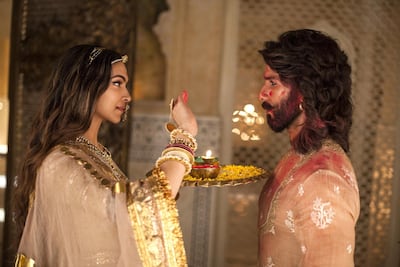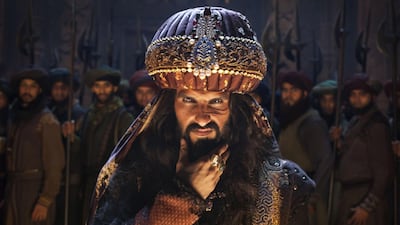I've just seen Padmaavat and I don't understand the controversy.
The film sees the ruler of the Delhi Sultanate, Alauddin Khilji, wage a war with Rajput king Ratan Singh to take the latter's beautiful wife Padmavati. As far as I can see it has no content that justifies protests by Hindu nationalist groups, such as Karni Sena, which have become more furious in the past few days with attacks on theatres and school buses.
If anything, Sanjay Leela Bhansali’s film is an ode to Rajput bravery. He casts not only royalty, but seemingly everyone in the kingdom – from the brave soldiers and ministers to the queen’s dasis (maids) – in a good light.
Given all the drama off screen, it's not surprising that the film opens with a string of disclaimers to make it clear that it takes its inspiration from a poem written by the Sufi poet Malik Muhammad Jayasi – even though, like in the film, Khilji and Ratan Singh were on throne in the 14th century and a war was actually fought. That said, there is actually little historical evidence to support Queen Padmavati's existence.
No animals were harmed in the making of the film either, it’s declared, lest animal activists should throw their arms up in protest for good measure.
The anti-hero shines
Khilji, played by Ranveer Singh, is a man who has two great passions in life – power and the wish to own everything that is 'naayab' (beautiful and unique). He's unapologetically bad and does not let anything or anyone get in the way of what he wants. An arch manipulator, he preys on women, never plays fair, kills his best friend and does not fear death.
A remorseless anti-hero, he takes his place as the king of the Delhi Sultanate by killing his uncle Jalaluddin, shortly after the latter gifted him a slave, Malik Kafur, played by Jim Sarbh.
Meanwhile Ratan Singh (Shahid Kapoor), who is in Singhal (present day Sri Lanka) to source pearls for a necklace for his wife, meets, falls in love and marries Padmavati (Deepika Padukone), and brings her back to Chittor. When Khilji hears of her exemplary beauty, he makes it his mission to procure her (spoiler alert) – but that is not to be.

Padmaavat has all the elements of a classic Bhansali period extravaganza – resplendent costumes (designed by Rimple and Harpreet Narula), opulent palace and sets, elaborate dance sequences, a fearless female protagonist and beautifully shot fight sequences.
Singh shines, but there's too much déjà vu
This is Bhansali's most expensive film to date – and it shows. There is an almost constant sense of déjà vu while watching this film. Fans will find Deepika Padukone's character too much like Mastani in Bhansali's last film Bajirao Mastani; a few songs are distractingly similar to the ones in Goliyon Ki Rasleela Ram-Leela, especially Ek Dil Hai; and even the beige and silver interiors inside the palace are reminiscent of Shaniwar Wada in Bajirao Mastani.
Shahid Kapoor is a bit underwhelming. While he looks the part of the handsome Rajput king, his character pales alongside Khilji and Padmavati.
______________
Read more:
Padmaavat will get a limited release as tensions rise in India
5 Bollywood films that faced controversy before release
______________
Happily, there are things that redeem the film. Ranveer Singh shines in his portrayal of Bhansali's Khilji as a heartless beast. He is menacing, brutal, passionate, unpredictable and exciting to watch.
Sarbh impresses with his expressions, peculiar mannerisms and nuanced performance as the slave who seems blinded by his love for Khilji. Padukone looks nothing short of breathtaking in her elaborate lehengas and beautiful jewellery, and is convincing as the brave and graceful queen, a voice of reason between two egoistic men.
The most memorable scene depicts the mass self-immolation by Hindu women to protect their honour in the face of defeat in war. From a film-making point of view, seeing the women dressed in their bridal finery – from old and young to pregnant and even child brides – set against the scene of war is striking and shocking.
The triumvirate of Ranveer Singh, Padukone and Bhansali seems to be on a winning streak after Goliyon Ki Rasleela Ram-Leela and Bajirao Mastani, and it doesn't look like the Karni Sena will be able to break that any time soon.


